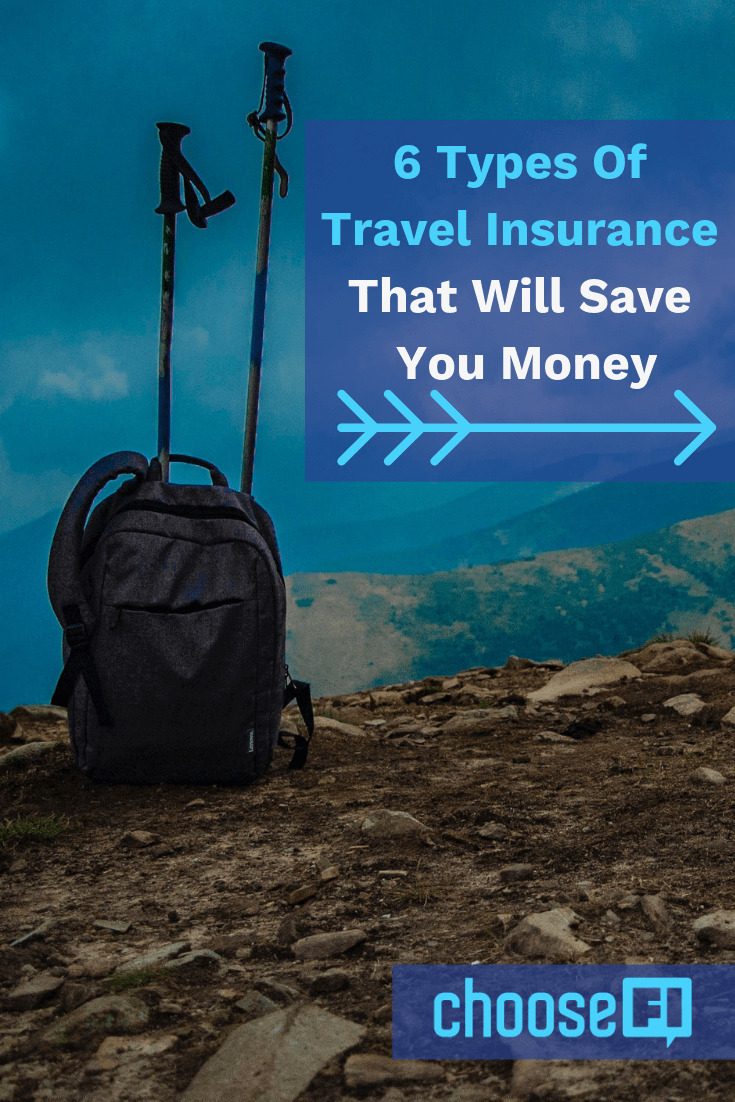Vacations are supposed to be an escape from the daily grind and all of your worries. But what happens when life’s troubles decide to tag along for the ride? Here are six types of travel insurance that will protect your vacation and save you money.
6 Types Of Travel Insurance That Will Save You Money
Travel insurance can come in many forms, some of which you may not be thinking of. You can buy a travel insurance policy to cover a specific risk or vacation, or you can cover all of your trips for a period of time. Travel insurance can be an embedded benefit in many of the places you’re already spending money, like credit card annual fees.
Let’s go over the different types of coverage and alternatives to travel insurance that can save you money.
Rental Car Insurance
To me, rental car insurance is such a racket. You pay sky-high rates for coverage that is rarely used. And some rental car agencies give you the hard sell for policies that cost $11 to $45 a day. Many times, the car insurance rates are higher than the daily rate I’m paying for the actual car.
Don’t do it! There’s a better way.
With some premium credit cards, rental car insurance is an included benefit. Simply pay for your rental car with that credit card and you’re automatically covered when traveling within the United States. If you’re traveling internationally, contact your credit card to confirm your covered benefits.
There are two types of credit card-based rental car insurance–primary and secondary. Primary means that the credit card insurance will cover the damage to the rental car without involving your car insurance back home.
Secondary insurance covers whatever your auto insurance back home won’t cover, which is your deductible in most cases.
Take note that primary and secondary rental car insurance from your credit card will only cover damage to the rental car. It does not provide liability insurance that covers damage you cause to property, vehicles, or people.
Trip Delays
If you travel enough, you’ll eventually have a flight delayed or canceled on you. This can cause a domino effect which can ruin a vacation. Airlines are becoming stingy about what they will and won’t cover in these situations.
Trip delay insurance provides reimbursement for reasonable meals, lodging, toiletries, medication, and other personal use items that you need due to the delay.
Every credit card has guidelines for when these benefits kick in. In most cases, the delays need to be six hours or more. And the reimbursements are often limited to $500 per ticket that was paid for (at least partially) with the credit card offering the trip delay benefits.
Delayed Baggage
Delayed and lost bags are a part of travel. I try to keep my bag with me at all times, but sometimes checking a bag is necessary. And, of course, Murphy’s Law means that my bag will be delayed on the one time I actually check a bag.
Delayed bag protection will reimburse you for the cost of necessary personal and business items while you wait for your checked bag when it’s delayed by your airline. This benefit will usually cover a change of clothes and toiletries up to a maximum amount. Coverage will vary, but $100 a day per family member affected is common.
Please remember that you should never check your passport, other critical documents, or valuables. Always keep them with you or in your personal item that you carry on the plane.
Purchase Protection
Purchase protection is one of my favorite benefits. I tend to buy new gadgets before heading out on vacation to try them out “in the wild.”
With a credit card’s purchase protection, your purchases can be protected from accidental damage or if they are stolen. The coverage can last up to 120 days from the date of purchase depending on the credit card terms. There are limits per incident and annual maximums that vary based on the credit card that you used, so keep that in mind.
The Chase Sapphire Reserve and United Explorer Card both cover your new purchases for 120 days from damage or theft. They will reimburse you for up to $10,000 per claim.
Medical Insurance
When people think of travel insurance, covering a medical emergency is what comes to mind most often. No matter how good your medical coverage is at home, once you travel internationally, the game changes.
If your medical insurance offers any international medical coverage, it is only for emergency medical procedures. The insurance company will most likely require you to pay the bill first, then submit a request for reimbursement.
Before your next vacation, call your medical insurance company to confirm what your benefits are and what the process would be in case you need to file a claim.
Of all of the travel insurance options, this is the one that concerns me the most. Depending on what your insurance provider says, it may make sense to pay for an international medical insurance policy or a travel insurance policy to cover medical situations.
Digital Backups
You have a lot of valuable information on your phone, tablet, and laptop. Before traveling with any of those devices be sure to back them up. I configured my devices to automatically back up whenever they connect to wifi. That way I won’t lose the latest pictures and documents that I’ve created.
I also like to keep digital copies of passports, birth certificates, and credit cards in secure online locations. This way, if anything is lost or stolen, you can easily download the necessary documents to get new identification from the consulate or contact the credit card company to rush you a new card. For added security, keep these documents in separate locations online or with different services.
Protecting Yourself Doesn’t Have To Be Expensive
Travel insurance policies can be a big chunk of your travel budget if you’re not careful. Most of the travel insurance coverage that companies want you to purchase is already included in the things you pay for. Before you shell out your hard-earned money on travel insurance, research the benefits you have to find out if you’re already covered and for how much. Then you can make an informed decision about what risks you’re willing to take and what travel insurance you need to buy.
If you really want to maximize your travel rewards check out our Ultimate Guide to Credit Card Travel Rewards series!
Top Travel Rewards Offers
Top Travel Card
Details: $95 annual fee | Earn 60,000 bonus points after you spend $4,000 on purchases in the first 3 months from account opening.
Most Flexible Travel Card
Details: $95 annual fee | Enjoy a one-time bonus of 75,000 Miles once you spend $4,000 on purchases within 3 months from account opening
Best Card for Side Hustlers and Business Owners
Details: $95 annual fee | Earn 100,000 bonus points after you spend $8,000 on purchases in the first 3 months from account opening.




